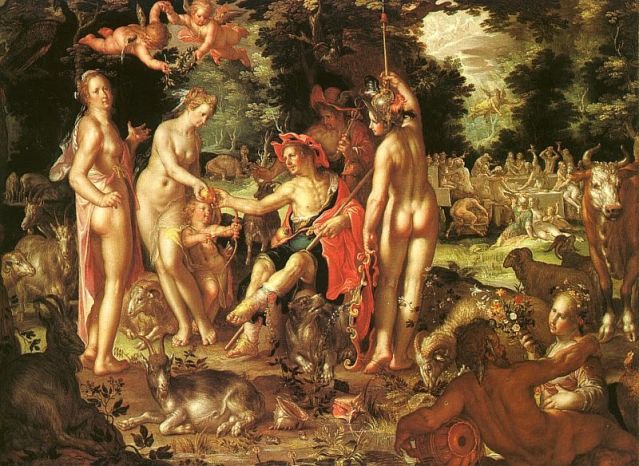Relationships
The First 3 Steps of Human Courtship
Could a masterpiece of art reveal the science?
Posted March 20, 2023 Reviewed by Jessica Schrader
Key points
- Psychological principles are represented symbolically in myth and art.
- Jungian psychology addresses the psychology of storytelling.
- Evolutionary psychology addresses the psychology of the instincts.

When I teach in London, I always take students to the National Gallery in Trafalgar for an afternoon. Some of the paintings I first saw many years ago are instructive in piecing together the working parts of human courtship, most notably the Wtewael masterpiece The Judgment of Paris.
The Greek myth depicted in this painting may very well reveal the first three steps of human courtship for us.
It begins with the tale of Zeus’ solution to a great conflict started at an Olympian feast by Eris, the goddess of discord, the only deity not invited. Her devious, jealous plan for revenge was to roll a golden apple into the festival, inscribed with the word Kallisti—or “for the fairest.”
Before any celebrants realized the vengeful trick, the goddesses Aphrodite, Hera, and Athena were already in bitter conflict over who should possess this honor of “being the fairest.”
When they approached Zeus, he wisely refused to be the judge, instead suggesting that the most desirable, wealthy, famous, handsome mortal in the world, Paris, be the one to decide the contest’s winner.
Hera offered Paris “dominion over the whole world, and all its possessions and property,” while Athena offered “the ability to win every battle he would ever fight.” For her part, Aphrodite offered “beauty” in the form of Helen of Troy, the wife of the Greek warrior Agamemnon.
We all know that in the end, “the face that launched a thousand ships” was Paris’ choice, and the Trojan War commenced. And so, Eris, the goddess of discord, had her revenge play out both among nations and husband and wife.
It might be intuitive to understand how this high-status male might instinctually desire a woman for her beauty.
However, why would the myth reveal such detail about Hera and Athena without their traits also offering more clues to the role of male desire in the human courtship process?
Discovering Love Through Art and Science
Love doesn’t need to be just the stuff of romance novels and rom-com cinema.
There is evidence for the working principles of human courtship in research from attachment theory, the instincts of evolutionary psychology, the communication principles of the Gottman Method, the character virtues explored by positive psychology that strengthen the partnerships of couples, tempered against the marriage-busting narcissism laid out in the principles of self psychology.
Attachment theory—once thought to pertain only to the dynamics of mother and infant—has been found to apply to every adult romantic relationship.
Even Conrad Lorenz’s discovery of imprinting has a role in human courtship—an instinct that may be “turned on” only if the right conditions are met at the right time.
All these models of psychology matter when it comes to romance, but none of them explain all of human courtship in practical terms. We need a synthesis of diverse theories that makes bringing lovers together easier.
I believe all the other models find their place in a synthesis of Jung and Darwin.
In Jungian psychology, honoring and expressing the archetypes yield universal sources of “libido” or “passion for life.”
In parallel, Darwin’s natural selection means that certain genes rise to prominence in the hostile environment of nature. These genes help the individual survive but also drive mate selection such that the genes favoring survival are most successfully passed on.
The survival and reproduction that our instincts drive cause us to feel passion when they are expressed, just as the Jungian archetypes do. "Passion" is the only word used for both the excitement of being alive (survival) and the excitement of early romance (reproduction).
It would follow that “masculine and feminine instincts” are unconscious processes that inspire male and female passion for one another. These instincts make males and females “feel more alive” and have more vitality.
We feel passion for a partner in this first phase of courtship, “falling in love.”
“The Judgment of Paris” Offers Us Three Steps for the Instincts of Early Courtship
In studies by Seager, Barry (2019), and others, universal traits in males and females are starting to be identified throughout all world cultures and are durable throughout history.
Let's consider these findings in examining the story of The Judgment of Paris. I believe the mythologic “gifts of Aphrodite, Hera, and Athena” to be clues composing the first three steps of the first phase of courtship, or “falling in love.”
Step 1: Beauty and Mystery
Aphrodite offered “beauty” to Paris in the form of Helen, and he chose Aphrodite as Kallisti, “the fairest” or most desirable.
In evolutionary psychology, beauty does not just mean a surface appreciation of the female sex. In the art world, symmetry is “beautiful,” and biological, physical symmetry is a sign of genetic robustness—an indicator of the viability of future offspring.
This “Aphrodite Instinct” for the healthfulness of physical symmetry is paired with a “mysterious” element in the male, which has been described as a feature of Jung’s “Electra Complex”—the period of a young girl’s life when her father represents a mysterious source of safety and protection.
The analogous male instinct is Hermes, in his fast-talking, humorous communication (the “trickster archetype”), the mysteriousness appreciated by women as an attractor.
For an example of this step, see the introductory scene from the film Closer (2004).
Alice, a beautiful American walking the streets of London, is distracted by Dan, the mysterious man approaching from a distance. Struck by a car, she comes to find him hovering over her, gravely concerned.
It is a lovely, wordless scene of the very beginning of love, ending in Alice's first words to Dan:
"Hello, stranger."
Jung’s view of Zeus as a “father archetype” is also seen in the universal male “provisioner/provider” behavior studied by Martin Seager (2019), expressed when Jung’s Electra Complex of girlhood becomes an attachment mirrored by a “Zeus Instinct” in the compatible males of adulthood of the next step.
Step 2: Ladies and Gentlemen
To the ancient Greeks, Zeus promised divine providence in ultimate provider and protector functions, inspiring citizens, soldiers, mothers, and daughters.
Seager, Kingerlee, and Barry (2019) have identified a male Jungian “archetype” for providing, provisioning, and protecting, as well as a feminine “archetype” for mothering and nurturing found in every culture on the planet.
The familial relationship of Zeus and Hera is demonstrated in real-world dating. Such behaviors favoring the other partner demonstrate how the other will care for both the partner and their children should a longer-term committed relationship emerge.
Hera offered Paris the gift of “dominion over the whole world and its possessions and property” for the male to feel of the highest rank and value in her eyes as compared with other suitors—even in desperate times—if only he would choose Hera as Kallisti, “the fairest.”
For a cultural example from cinema, see this scene from Jerry Maguire (1996), where Jerry is fired publicly and stands embarrassed and alone in a room of colleagues.
Jerry: "Who's coming with me?"
Dorothy: "I will go with you!"
Here, the "Hera Instinct" offers support, with the expectation that the "Zeus Instinct" will earn her gift in his future efforts and appreciation of her.
One’s “protector” may sometimes need to come into direct conflict with outside, threatening forces. This need for skill in the male of direct conflict in facing aggression leads us to the Greek god of war, Ares, embodied in the Ares Instinct, an “archetype” or instinct to fight and win, also studied by Seager and Barry.
Step 3: Winning and Losing
Ares was the brother of Athena, the goddess of both diplomacy and war. She was simultaneously a goddess of striving for diplomatic harmony. Yet to the ancient Greeks, she was also the judge of the winners of all wars, and competing combatants would pray to her to win their battles.
She had offered Paris the gift of “winning every battle he would ever fight” if he would agree to choose her as Kallisti, “the fairest.”
For a cinematic scene of this step that is nearly definitive of the film, see Match Point (2006), in which the female lead incites the male to compete with other males. The male lead, Chris, wins the verbal "match" with Nola, passing her test of the "Athena Instinct."
Nola: "Who is my next victim?"
Chris: "I'm naturally competitive... Is it off-putting?"
Think about your life and loves and consider that these three steps are all traversed at the start of the most satisfying, lasting relationships you’ve had, while the ones that didn’t work out were not your fault. They were just incompatibilities in one of these three first steps of courtship.
To think that we may find such clues to love in a masterwork of painting will always call me back on a pilgrimage to the National Gallery of London. I hope you make your way there, too, surrounding yourself with the beauty of psychology in art.
References
Miller, G. (2000). The Mating Mind: How sexual selection shaped the evolution of human nature. New York: Anchor Books.
Jung, C. G. (1915). The Theory of Psychoanalysis. Nervous and mental disease monograph series, no. 19. New York: Nervous and Mental Disease Publishing Co. p. 69.
Perrett, D. I., Burt, M., Penton-Voak, I. S., Lee, K. J., Rowland, D. A., & Edwards, R. (1999). Symmetry and Human Facial Attractiveness. Evolution and Human Behavior, 20, 295–307.
Bressler, E., & Balshine, S. (2006). The Influence of Humor on Desirability. Evolution and Human Behavior, 27(1), 29–39.
Law Smith, M. J., Deady, D. K., Moore, F. R., Jones, B. C., Cornwell, R. E., Stirrat, M. R., et al. (2012). Maternal tendencies in women are associated with estrogen levels and facial femininity. Hormones and Behavior, 61, 12–16.
Geary, D. C. (2000). Evolution and proximate expression of human paternal investment. Psychological Bulletin, 126, 55–77.
Cox, C. R., & Le Boeuf, B. J. (1977). Female incitation of male competition: A mechanism in sexual selection. The American Naturalist, 111(978), 317–335.
Barry, J.A., Kingerlee, R., Seager, M., Sullivan, L. (2019). The Palgrave Handbook of Male Psychology and Mental Health, pg 228. Palgrave Macmillan.




